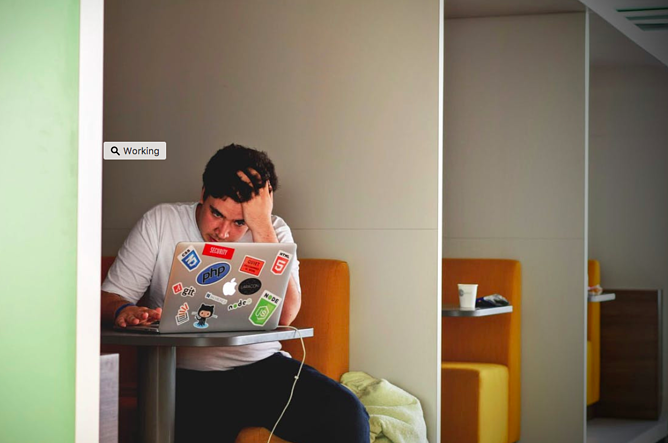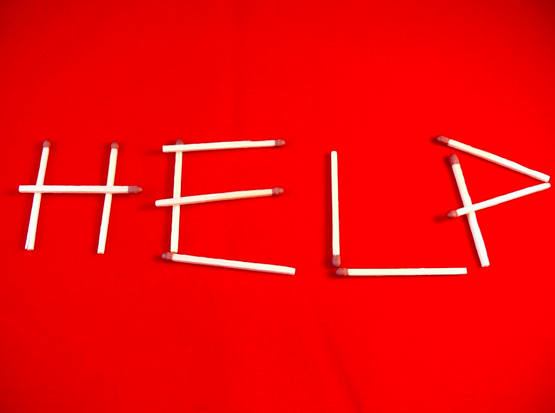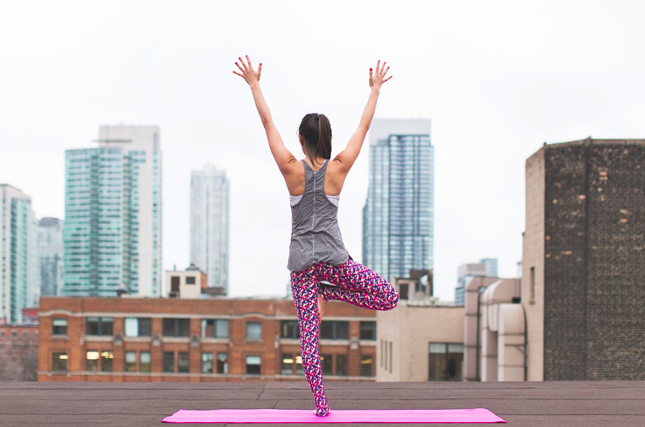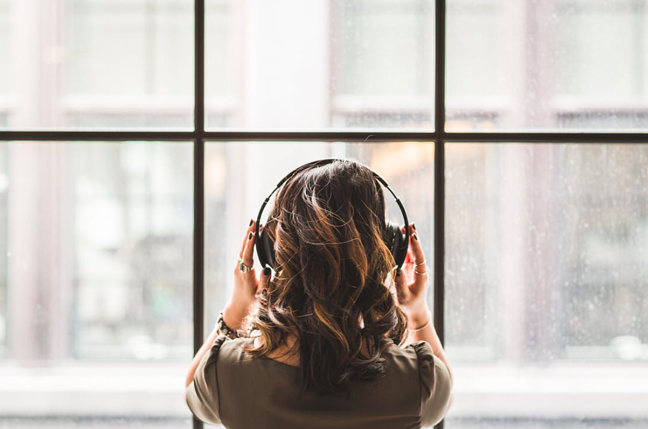
Growing up, you only know what you know.
I’m not 100% sure when my battle with anxiety started. I thought
I decided to write this post, to help other entrepreneurs in the same position,
A little story about anxiety
Before I tell you my story, I wanted to share a quote from one of my favourite books, “First We Make the Beast Beautiful”, by Sarah Wilson (yep, as someone who suffers from anxiety, one of my favourite things to do is to read about how my fellow anxiety brethren learn how to cope too). Some of you may know Sarah, she’s a media darling and the face of ‘I Quit Sugar’. However, she’s also (bravely) lifted the lid on her extraordinary and harrowing account of her battle with anxiety and other mental health issues.
When it comes to defining anxiety, Sarah has an uncanny way of expressing exactly what life is like for someone bound to it’s cruel, repetitive world. If you haven't experienced anxiety or aren’t sure what it is, here are a couple of my favourite lines from the book...
“Many of us suffering anxiety don’t look like we’ve got a problem because outwardly we function ludicrously well. Our anxiety sees us make industrious lists and plans, run purposefully from one thing to the next….. We are a picture of efficiency and energy, always on the move, always doing. But beneath the surface we’re being pushed by fear and doubt and a voice that tells us that we turn everything into a clusterfuck…. Sure we look busy, but we’re busy avoiding things.... And when it gets too much we go underground”.
I joined Recomazing in June 2015 and literally hit the ground running, hustling with our team of four (soon to be five) to launch the platform. I had left a job at a PR agency and felt for the first time in a long time, I was doing something challenging and extremely exciting. It was exhilarating working out of Fishburners a startup co-working space at the heart of Australia’s entrepreneurial movement. Fishburners was like an engine room of extremely smart, caffeine-fueled, entrepreneurs, all hustling to launch their startup hoping to create change and disrupt the industries in which they played.
Fast forward nearly 6 months, I was sitting under a tree in my hometown in country NSW, uncontrollably sobbing trying to explain to my petrified parents about how I didn’t see the point of it all. For months, I had successfully hidden a series of crippling anxiety attacks which eventually led to a debilitating depression. A depression that had left me empty, hopeless, overweight, deeply sad and lifeless. I can now see why my parents (and later my close friends) were so shocked to hear about this black cloud hanging over my head, as I always appeared to be ‘happy’. What they didn’t know was that behind closed doors every day became a struggle to get out of bed. To be social. To exercise. To live. That day, through all of the tears and the pain I was in, I told my parents I really wasn’t sure if I could continue on as I couldn’t see the point in anything anymore.
That day, sitting under that tree was one I’ll never forget.
The cold hard truth

I recently saw an incredible talk by Shelley Laslett, CEO & Co-Founder of Vitae.Coach. Vitae.Coach (Vitae) is an early-stage coaching startup combining neuroscience with AI. Vitae partners with VCs, accelerators/incubators and startup founders to help founders thrive as leaders to create sustainable and profitable businesses. Shelley’s presentation was all about why entrepreneurs need to take better care of themselves and boy did this talk hit home for me. And because I know how much entrepreneurs love data, I’ve linked up with Shelley to bring you some cold hard truths about the state of mental health for Australians and specifically our tribe - entrepreneurs:
- According to the Australian Bureau of Statistics, almost half (45% or 7.3 million) of Aussies aged between 16-85 years, have suffered a mental health disorder in their lifetime. Anxiety disorders and disorders associated with depression topped the list.
- When it comes to entrepreneurs, a recent study between Stanford University, Berkeley University and the University of San Francisco, lead by Psychologist Dr Michael A Freeman, revealed that: 72% of entrepreneurs studied reported known stress and a number of mental health concerns. This shouldn’t really come as a surprise as entrepreneurs have lower initial earnings, lower earnings growth, lower long-term earnings and greater work stress.
- Freeman’s study also showed entrepreneurs are:
- 30% more likely to have depression than other traditional careers.
- 29% more likely to have ADHD compared to other professions.
- 12% more likely to develop substance abuse/dependency.
- 11% more likely to develop bipolar disorder.
So there you have it. It’s there, in black and white, the data speaking the truth. The career of an entrepreneur isn’t easy. Entrepreneurs are more susceptible than the average employee, to developing mental health problems.
Shelley says it’s even more important for entrepreneurs learn how to look after themselves and their team because more people want to become entrepreneurs.
“Entrepreneurship is increasing not decreasing. 62% of millennials want to start their own business. If we are going to see people thrive on this journey and not just survive we need to change the way we approach the journey. We need more authentic, actionable, and meaningful ways to manage the stress of being an entrepreneur, beyond generic advice. Founder burnout is an all too common occurrence that with the right support and advice can mostly be avoided.”
Now I don’t know about you, but when I was looking to join the team at Recomazing, my mental health was not something I gave a second thought. Yet, it’s so important for us to understand the impact and hit it takes when working in the startup industry.
Stop glorifying the hustle

One thing I loved about Shelley’s talk was her call for entrepreneurs to stop glorifying the hustle.
“Please stop using the ‘Hustle’ as a socially acceptable mask, for unhealthy working habits. The crazy hours, the lack of downtime, the poor work culture and complete absence of self-care and team care. Hustle is not that. Hustle is focussed, meaningful and mission-driven. With focus and meaning comes balance and care, not imbalance and disregard. The more we glorify the journey and throw ‘you have to just hustle’ at the causes of stress and the warning signs of fatigue the worst we make it for ourselves, our team and our industry”, said Shelley.
(If you’re liking what you hear and want to learn how you can do this, you can catch Shelley and Vitae this month for Spark Festival on the 18th of October at Tank Stream Labs. )
I will raise my hand and say yep, I was one of those. It’s so easy to define yourself by your work and what you do. And as an entrepreneur, it’s almost a rite of passage to work yourself to the bone. But why? Does getting a full eight hours sleep a night make me any less deserving of wanting success compared to someone who only sleeps four? Does putting up boundaries and switching my phone onto ‘Do Not Disturb’ at 7.30pm make me less successful than someone who is happy to neglect family time and respond to emails at
Instead, why don’t we create leaders and teams where we can share our vulnerabilities? Being vulnerable creates
Dr Jay Spence,
"As employers and employees create new norms for work-life integration, there is a shift in how workplaces view "personal problems". The old view was that mental health is private and therefore the personal responsibility of the employee".
"Now, research shows that workplace factors play a significant role in mental health problems and employers are at increasing risk of claims made because they ignore these factors. That's the stick for an employer but the carrot is that there is also evidence for performance, retention and engagement improvements that come from investing into employee emotional health."
Why are entrepreneurs so susceptible?

An article by Jessica Bruder for Inc.com explores this darker side to #startuplife. Her story does a great job of explaining why entrepreneurs are more prone to hitting mental health hurdles over their employed counterparts - one reason is the high risk of failure associated with our line of work. She says according to research by Shikhar Ghosh, a Harvard Business School lecturer, three out of four venture-backed startups fail.
“Entrepreneurs often juggle many roles and face countless setbacks--lost customers, disputes with partners, increased competition, staffing problems--all while struggling to make payroll”, said Ghosh.
And he’s right, that’s a bloody tough environment right there.
Burder also interviewed psychiatrist and former entrepreneur Michael A. Freeman. He says new entrepreneurs often make themselves less resilient by neglecting their health by not getting adequate sleep, exercise goes out the window and their nutrition takes a back seat.
"You can get into startup mode, where you push yourself and abuse your body," Freeman says. "That can trigger mood vulnerability."
For me personally, I was financially stressed. I was consulting in PR on the side to support myself whilst I’d taken a 50% pay cut working at Recomazing. This meant working weekends and nights after work which meant I rarely caught a break.
I also didn’t talk about my struggles, I pretended that I knew what I was doing. It’s tough coming into work day in day out and feeling so far out of your depth but feeling like you should know what you’re doing. But how could anyone know what to do, when what you’re working on has never been created before? It’s shameful and it festers. It wasn’t until months down the track I started to reach out to my teammates, only to find out everyone else was in the same boat. Showing vulnerability helped to crush the deep shame I was feeling. It helped me to understand that it was ok, that I wasn’t a failure.
Dr Spence, Director and Founder at Uprise, says entrepreneurs are at particular risk for mental health issues because the factors that make them great also create blind spots.
"Entrepreneurs have to be optimistic but stress can cause optimism to tip over the fine line into delusion. They have to be results focused but obsession with results often causes them to neglect the factors that we know are associated with long-term happiness: relationships and emotional maturity. An obsession with results can sometimes be another term for fear of failure.
He says most entrepreneurs encounter failure daily and depending on their emotional maturity it's experienced in two main ways.
"One is the experience of being on the edge of a cliff. That version generates enough fear for entrepreneurs to throw themselves into more and more work until they feel safe to stop. Only the definition of safety isn't defined. It's a moveable feast that tends to evaporate with each milestone."
"The other experience is surrender. It's anathema to most entrepreneurs because it feels like giving in to failure. Although it's terrifying it's actually a paper tiger. I once had a conversation with my brother who found me working at 5am and I asked him why he wasn't afraid of failing. "What you don't understand is that the lesson of failure is trust. You don't trust that things will still work out if you fail, and usually better than if you think." Research supports that he's right. The treatment for fear of failure is more exposure to failure while observing how things work out without constant personal control and influence. Learning to fail is a catch-cry in our industry. Learning to trust is our growing edge."
10 Ways to keep the beast at bay
Looking back on that afternoon in 2015, a part of me is happy I went through what I did because it forced me to reach out and through the support of family and friends I was able to take the necessary steps to get help. For me, that was going on anti-anxiety medication for just over a year and a half, coupled with regular sessions with a psychologist to learn strategies on how to deal with crushing episodes of anxiety and to help scoop me out of the depression which gripped me so tightly. On top of this, I read a lot on the subject and still continue to do so, which has also equipped me an arsenal of ideas to manage my anxiety. And the key word here is 'manage'. For me, I'll always live with anxiety. There is always going to be days harder than others, however, I'm learning how to acknowledge it and manage it so I come out on top. Not crippled and down.
I’ve reached out a to a few awesome entrepreneurs and mental health experts in the industry to hear about some of the strategies they use to manage their mental health. I’ve also thrown in a few of my own tips and tricks that have helped me along the way, to keep the beast at bay.
(Before we jump into this, please know I do not claim to be a trained psychologist or a doctor - I’m just sharing my experience with you in a hope to provide some examples of how you can look after your mental health too. Some might work for you, some might not - this isn’t a one-size-fits-all approach).
1. Create space And boundaries

Due to technology, we are no longer bound to the 9-5 working day. Just Slack alone has created a place for meetings 24/7, let alone emails, social media and the rest. I’ve had to work hard to ensure I create space to just be. Sans mobile phone. Sans technology. Sans work. Go for a walk and leave your phone at home. When you get home, switch off your mobile and focus on the people in front of you, as they’re the ones who matter the most. When you're hard-pressed trying to slow your mind, constant stimulation from technology is a complete recipe for disaster. It only creates mental exhaustion which leads to stress and anxiety. Boundaries are so important, fight for them.
2. Practice self-compassion
Jamie Watson, CEO at RAW Mind Coach, an e-learning program designed to build resilience at work says engaging and regularly practising self-compassion will help to quieten your inner critic.
“Just like me, most people have a fierce inner critic. Attentively we tune in to a voice which says things like “You’re not good enough. You don’t know what you’re doing. You’re an imposter. You’re too fat. You’re too dumb.” The more we keep listening to these taunts, the more the feelings of inadequacy grow".
He says the best way to change this inner conversation is by offering yourself kindness and compassion.
“Self-compassion is not just about words – it also requires action. It involves regularly doing things which nurture and restore you like taking a long hot bath, listening to your favourite music, chatting with a friend, take a walk in nature or cooking your favourite meal. All of these simple, self-compassionate acts can boost your wellbeing and help you become more resilient”.
3. Crack a sweat

Here at Recomazing, one of our company values is looking after our health. The actual value states: ‘We welcome healthy debate, as well as healthy minds and bodies”. Whether it’s getting out for a 30-minute stroll or sweating it out in the gym across the road, we have built a culture where this is encouraged and this time is respected.
One of my favourite books is called Brain Rules by John Medina (thanks for the reco Miles!). He talks about why aerobic exercise is important for brain functioning and how it boosts brain power. He says exercise improves cognition for two reasons:
1. Exercise increases oxygen flow into the brain, which reduces brain-bound free radicals. One of the most interesting findings of the past few decades is that an increase in oxygen is always accompanied by an uptick in mental sharpness.
2. Exercise acts directly on the molecular machinery of the brain itself. It increases neurons’ creation, survival, and resistance to damage and stress.
"Tests that measure long-term memory, reasoning, attention, problem-solving, even so-called fluid-intelligence tasks. These tasks test the ability to reason quickly and think abstractly, improvising off previously learned material in order to solve a new problem. Essentially, exercise improves a whole host of abilities prized at work".
If exercise helps us to perform better, so we can achieve more, it doesn't make sense when entrepreneurs don't make exercise more of priority in their day.
4. Talk to someone

When it comes to better managing your mental health, Prominent Australian founder, entrepreneur, investor and Venture Portfolio Manager at Muru-D, Mick Liubinskas says it's crucial to ask for help.
"Join networks, go to events, call your mentors and friends. Share your challenges, fears, imposterness and anxiety. It’s scary, but once shared, they become slightly easier. You will also hopefully get some empathy and even better, some strategies for dealing with them. None of this is easy, but it is doable. Ruts happen and the daily emotional rollercoaster takes it’s toll".
When I look back on my journey, each time I spoke to someone about my struggle, became real, vulnerable and raw, I felt better. Find that someone who is going to sit there and listen to you and support you, because that’s the best thing they can do.
I was fortunate to be able to open up to my parents and then also my close friend who had been through something similar. And then when I felt like the time was right, I spoke to my boss, Marc Cowper about it. It wasn’t a play for pity, but it did help him understand why I wanted to work from home once a week. I let him in, I gave him context around my situation and provided him with an opportunity to help. Which he did. Because good people like to help. They want to help you. So don’t be afraid to reach out to someone.
5. Work from home
Working from home has been one of the best things I’ve done to help manage my anxiety and mental health. Before I approached my boss Marc about working from home, I had thought about it for over 6 months. I always shied away from asking for the flex thinking work would never agree. What I didn’t realise at the time, was that this would be my most productive day of the week. Every Wednesday I take a day to work at home, to rebalance. Every Wednesday I don’t have to battle public transport, be disrupted by meetings, or get pulled and pushed by other people’s agendas. I sit at home and focus. And when I want a break, I can take a walk outside, or if I feel like it, work from my local cafe for a change of scenery.
6. Sleep - a ‘not negotiable’

Sharon Leadbetter is the Workplaces Co-ordinator at WayAhead,The workplace program is an organisational support and resource for any workplace interested in supporting their employees’ health and wellbeing at work. Sharon says sleep is often seen as a trade-off in our modern lives as our work hours become longer and longer.
"Have you heard the expression ‘I’ll sleep when I’m dead’? Unfortunately, most people’s health is impacted if they don’t get enough sleep over weeks, months and years. Most adults in Australia don’t meet the recommended 7- 8 hours sleep a night".
"Research is now showing the links between lack of sleep or poor sleep routines on chronic health conditions, mental illness, energy, mood management, creativity, and conversely those same health conditions can affect your sleep quality. When we don’t sleep well consistently, we can end up craving foods high in sugar, fats and salt, which may lead to weight gain for those people with poor sleep".
She says it's imperative entrepreneurs avoid burnout by ensuring they get enough sleep.
"Entrepreneurs live with lots of financial uncertainty, often work very long hours on their own and take on a lot of responsibility for their businesses before they take off and become more stable over time, so feel high stress and anxiety levels at different times."
"It is really important to develop good sleep hygiene as sleep plays a huge restorative role with our bodies and minds and enables us to be highly functioning, productive, creative and focussed. Our brains and bodies were not meant to be run 24/7, if they are, it is a fast track to burn out. We need time to stop, switch off and recharge – just like our devices!"
7. Journaling is the new black

Katherine Boxall, Founder and Coach at the Self Harmony Project, recommends journaling to help keep your thoughts in check.
“When mental health issues present themselves it means your mind is in a negative thought ‘tangle’, like your own personal Charlotte’s web full of bullshit but there’s no talking spider telling you that you are ‘RADIANT” when you wake up in the struggle-barn again.
“Journaling is a simple way to start unravelling the negative thought processes and create new positive pathways, through new self-awareness. It allows you to deal out some swift dick-punches for your inner dialogue when it’s behaving like a bit of a flog”, says Katherine.
When it comes to writing Katherine suggests reflecting on two areas:
1. Journal your thoughts and fears, plus your “I shoulds” and “I have tos”.
Challenge these as being the truth vs a story; go full “mythbusters”on them. For entrepreneurs, typically being high achievers - the stories around success, failure and its meaning can be valuable topics to journal about.
2. Journal your wins
You’ve been out and about entrepreneur-ing; just GETTING SHIT DONE like nobody’s business but in your faux-hustle you may be ignoring or discounting your wins. Write those babies down: big/small, full credit, no discounts!
8. Celebrate the WINS
When you work for a fast-paced startup it's so easy to focus on the next task on your
At Recomazing we've set up a channel on Slack called #wins_and_losses, and each week, each team member posts about their win and also a learning they experienced. It's such a simple thing to do, costs nothing and takes very little time to do, but the effect it has on team morale is priceless. Acknowledging our achievements as a team creates a positive environment to work in, increases job satisfaction - especially when some weeks seem like 5 days of fails - you can always find something to post.
Check out Slack here on Recomazing.
9. Music is your ally

When my anxiety is supercharged my senses and nerves go into complete overdrive: smells are unbearable, food tastes too strong, but the worst sensation is my hypersensitivity to noise. When you’re working in an open-plan office, being hypersensitive to sound can make it near impossible to concentrate on the task at hand. Trying to be present in a meeting or simply comprehending something someone has said to you across your desk is really hard when all you can hear is the person on your left clicking their pen, someone three desks away talking loudly on the phone, or the siren of an ambulance speeding down the street. Typing on a keyboard can cripple your afternoon.
When I’m like this, noise overwhelms me and makes my thinking extremely foggy. It’s hard to settle myself in the office when I become hypersensitive, however, my noise cancelling headphones do help. If I can handle music, I play soothing classical music or my favourite Jack Johnson playlist and it calms me. I plug in, and I focus and most importantly it gives me a chance to help my nerves and senses settle.
10. Let meditation do you
I once read in Arianna Huffington’s book, Thrive, how you shouldn’t do meditation. You just sit there and breath and let meditation, do you. It wasn’t until I read this, my view of meditation changed. I was one of those people who dabbled in it here and there, but I always felt like it was a chore. But now, it’s something I look forward to - sitting there for 10-20 mins breathing. Yes, it can be super uncomfortable sometimes. Some days I sit there and I can’t get a handle on my thoughts. They race and race and race. But I keep doing it because creating a habit is the most important thing.
My secret weapon is the Headspace App. Ah, Andy how much I adore you. This year all staff at Recomazing were given a one-year subscription to the app, as a step to help staff look after their noggins. This has been one of the best things we’ve done for the team.
The team at Centered Meditation are also highly recommended on Recomazing. Their peaceful space in Sydney's CBD is perfect for busy entrepreneurs looking for a break to rebalance. Check them out here.
Let's do more of the good stuff
Before I finish, I also wanted to give a shout out to those in the industry working hard to support others in positively supporting their mental health.
Tank Stream Labs + Shelley Laslett, Vitae Coach
Tank Stream Labs have partnered up with Shelley from Vitae.Coach to provide members with Sound Boarding Sessions. This initiative gives members a free 30 min session to help them think through any small, drawn-out or challenging startup decisions that don't seem to have a clear-cut answer.
The Hub @ Southern Cross Melbourne
On a recent tour of The Hub, I was happy to see they have built relaxation and recreational facilities which are available 24/7 to members. Their meditation room gives residents a space to get away from their desk and just be. They also have a gym where members can break a sweat and mix up their day.
The UTS Psychology Clinic is a not-for-profit teaching and research clinic that provides quality services to entrepreneurs at a low cost. Located just up the road from Fishburners, Australia's largest tech startup space, provide support by Provisional Psychologists in their final years of training (Year 5 and Year 6) under the supervision of highly experienced registered Clinical Psychologists and Neuropsychologists.
Do you have any strategies to manage your mental health? Please let me know in the comments section below. Also, if you have any recommendations for tools and services to crush anxiety and stress then please leave a reco on Recomazing. Your recommendation will go a long way to helping our wider community manage their mental health!

